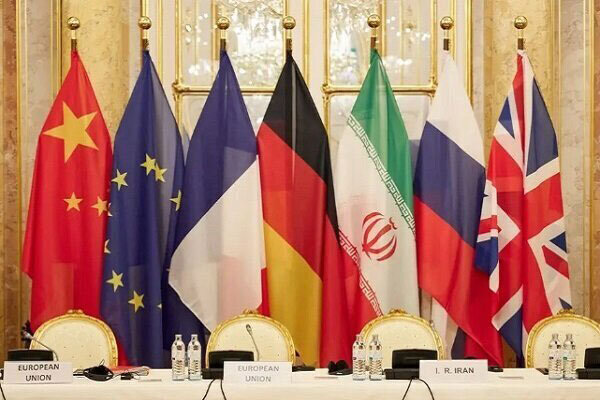The legitimacy of running the JCPOA dispute resolution mechanism
An analysis of E3 compliance and Iran’s responsive measures

TEHRAN – The Joint Comprehensive Plan of Action (JCPOA), signed in 2015, incorporates a Dispute Resolution Mechanism (DRM), commonly referred to as the “snap-back mechanism,” to enforce compliance.
The European Trio is now threatening to trigger the snapback and, through that, return UN sanctions against Iran. However, in doing so, Europe is ignoring the current situation and the background of the deal's implementation, which make the procedural ability to activate the mechanism invalid for France, Germany, and the United Kingdom.
The JCPOA, signed on July 14, 2015, by Iran, the P5+1 (United States, Russia, China, France, United Kingdom, Germany), and the European Union, aimed to enhance transparency in Iran’s nuclear program in exchange for sanctions relief. The DRM, or snap-back mechanism, enables the re-imposition of UN sanctions for significant non-compliance. While the E3 can procedurally trigger this mechanism under paragraph #37, doing so would be illegitimate. Iran’s nuclear advancements since 2018 were remedial responses to the U.S. withdrawal in May 2018 and the E3’s failure to fulfill commitments, consistent with Iran’s rights under paragraph #26.
The concept of abuse of rights
The principle of abuse of rights in international law prohibits states from exercising rights in ways that undermine others’ rights or breach good faith. The ICJ’s Namibia Advisory Opinion (1971) established that South Africa’s illegal presence in Namibia stripped it of the legitimacy to assert legal rights. Similarly, the E3’s non-compliance with JCPOA obligations—failing to deliver Iran’s economic benefits and aligning with U.S. sanctions—undermines their standing to invoke the snap-back mechanism. Such an action would constitute an abuse of rights, violating “ex injuria jus non oritur” (no right arises from a wrong).
Background of the JCPOA
The JCPOA emerged from decades of mistrust. Iran’s nuclear program, initiated in the 1950s, became a flashpoint in the 2000s, leading to UN sanctions (2006–2010) and U.S./EU measures that affected Iran’s economy. Negotiations from 2003 to 2013 saw slow progress until President Rouhani’s election and U.S. policy shifts under President Obama facilitated the 2015 agreement. The JCPOA restricted Iran’s nuclear activities, such as uranium enrichment, while offering sanctions relief in trade, finance, and energy. The DRM addressed mutual distrust, but the U.S. withdrawal in 2018 under President Trump’s “maximum pressure” campaign shifted the burden to the E3.
The JCPOA’s Reciprocity Structure
The JCPOA is built on reciprocity, with the DRM (paragraph #37) allowing participants to reinstate UN sanctions for non-compliance. This mechanism deters violations by threatening to reverse sanctions relief. Its validity depends on the invoking party’s compliance. The U.S. withdrawal in May 2018 and sanctions re-imposition marked the initial breach. Iran maintained full compliance for a year, as confirmed by IAEA reports, before initiating remedial measures in May 2019, such as enriching uranium to 20%. These align with the JCPOA’s retaliatory provisions and the Vienna Convention on the Law of Treaties (1969), which permits proportionate responses to material breaches.
Paragraph #26 of the JCPOA permits Iran to step back from implementing its limitations under the deal. Iran’s measures from May 2019—expanding centrifuge operations, increasing uranium enrichment levels etc.—were gradual, reversible, and proportionate, signaling adherence to the JCPOA’s framework. After the U.S. withdrawal, the E3, China, Russia, and the EU were tasked with upholding the agreement. Unlike the U.S.’s abandonment, Iran's calibrated responses reflect good faith and commitment to the JCPOA’s legal structure.
The E3’s Breach of Obligations
The E3’s failure to deliver economic benefits violates the JCPOA, undermining its legitimacy to invoke the snap-back mechanism. The JCPOA’s Preamble and Annex II mandate sanctions relief in trade, finance, and energy. However, the E3’s over-compliance with U.S. secondary sanctions blocked Iran’s economic opportunities, with European banks refusing transactions with Iranian entities. The Instrument in Support of Trade Exchanges (INSTEX) was largely ineffective, processing only one transaction by 2020. The E3’s support for U.S. pressure, including renegotiation discussions, breached paragraphs #28 and #29. Iran’s DRM invocations (e.g., August 2018, November 2018) were ignored, prompting its remedial measures. Iran’s letters (2016–2021) detail the E3’s failure to enable banking, trade, and INSTEX, confirming their non-compliance.
The E3’s breaches render their potential use of the snap-back mechanism invalid. Iran’s nuclear advancements were retaliatory measures under paragraph #26, responding to the U.S. withdrawal and E3 inaction. No participant has formally declared Iran non-compliant, reinforcing its status as a retaliating party. Invoking the DRM would misuse a legal tool to penalize Iran’s contractual rights, breaching “pacta sunt servanda”. Realist theory explains the E3’s deference to U.S. sanctions as prioritizing strategic interests, undermining the JCPOA’s multilateral framework. Iran’s adherence to retaliatory provisions reflects legalism, exposing the E3’s failure to uphold reciprocity.
The E3 can procedurally activate the JCPOA’s snap-back mechanism, but such action lacks legitimacy. Iran’s post-2018 nuclear advancements were remedial and reversible responses to U.S. and E3 breaches, permitted under paragraph #26. The E3’s failure to provide economic benefits, complicity with U.S. sanctions, and neglect of the DRM undermine their authority. Using the snap-back would misuse a legal instrument, jeopardizing the JCPOA and multilateral diplomacy. To salvage the agreement, the E3 must operationalize economic mechanisms and counter U.S. sanctions.
The saga over the activation of the snapback mechanism underscores challenges of enforcing international agreements under hegemonic pressures and emphasizes the need for reciprocity and accountability in nuclear diplomacy.
Leave a Comment